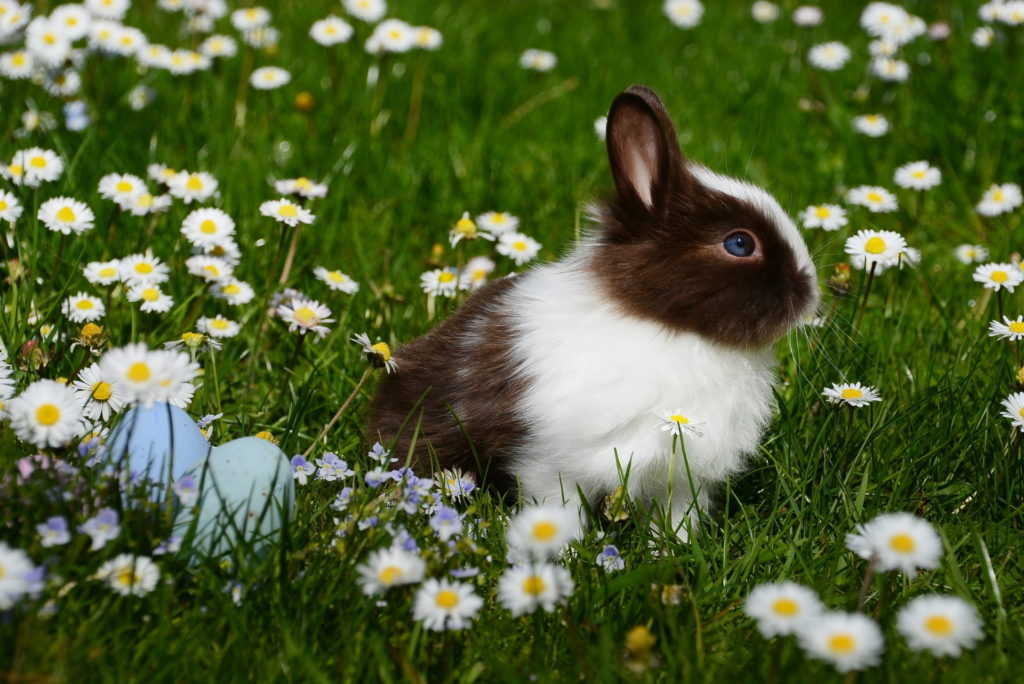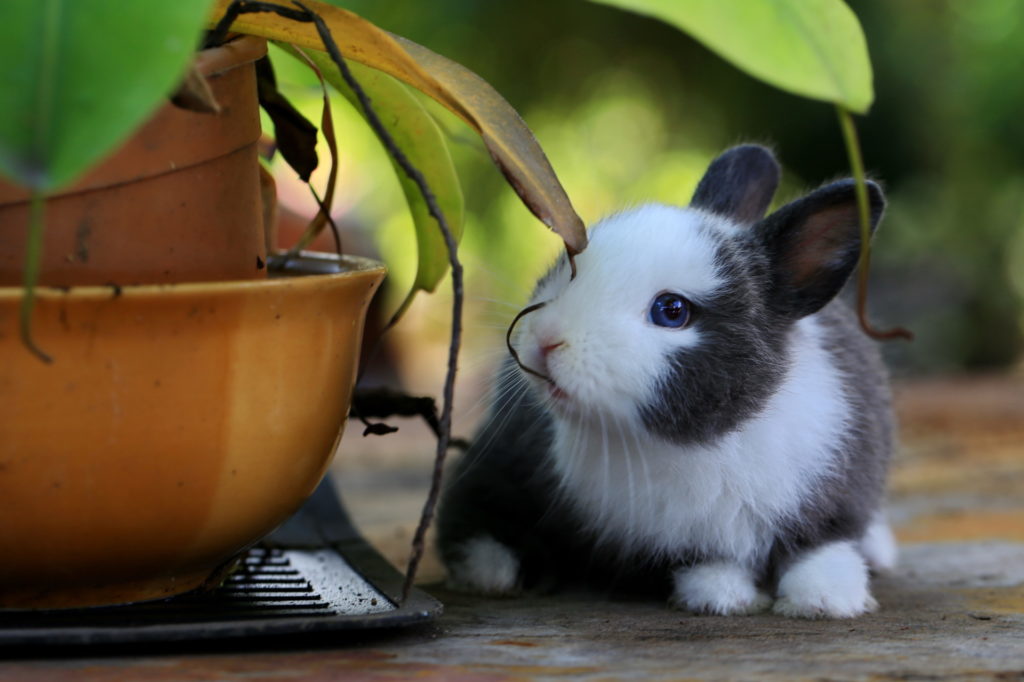Rabbit Care
(Oryctolagus cuniculus)
Rabbits are popular pets for children and adults alike. They are social animals that naturally live in groups, making them great companions for humans too. They are crepuscular (active at dawn and dusk), which means they often fit in well with our working lifestyles. Rabbits love company and need at least 3 hours of social contact per day if kept singly. Rabbits have been kept by humans for centuries and we now have many great domesticated breeds. Popular breeds include the Dwarf lop, Dutch, Himalayan, Rex, Swiss Fox and Angora. They range in size from over 6 kg for a British Giant to less than 1 kg for a Netherland dwarf. If we feed and care for them appropriately, rabbits can live up to 10 to 15 years in captivity.
Rabbits are popular pets for children and adults alike. They are social animals that naturally live in groups, making them great companions for humans too. They are crepuscular (active at dawn and dusk), which means they often fit in well with our working lifestyles. Rabbits love company and need at least 3 hours of social contact per day if kept singly. Rabbits have been kept by humans for centuries and we now have many great domesticated breeds. Popular breeds include the Dwarf lop, Dutch, Himalayan, Rex, Swiss Fox and Angora. They range in size from over 6 kg for a British Giant to less than 1 kg for a Netherland dwarf. If we feed and care for them appropriately, rabbits can live up to 10 to 15 years in captivity.
What should I feed my bunny?
Rabbits are herbivores, adapted to a leafy diet. Rabbits are not rodents. They have two sets of continuously growing incisor teeth that help them process grass and hay. They also have large, long rooted premolar and molar teeth to grind down food. Feed your pet rabbit good quality pasture, meadow, oaten or timothy GRASS hay. Offer about the size of your rabbit in hay per day! Provide fresh hay and cut grass in a wire rack off the floor of the enclosure. This avoids soiling with faeces and urine and keeps it fresh. Lucerne or alfalfa hay is high in calcium and protein. It should be given to young, growing rabbits under six months old and breeding does (about 25% of hay ration).
What about commercial rabbit food?
There are two main types of rabbit food available. Selective diets (grain, chaff and pellet mixes) and non-selective diets (extruded pellets only). Mixes are often high in grain, seed and chopped hay. They may have dried fruit or nuts added which are high in sugar and fat. These diets are NOT appropriate for your pet rabbit.
In general, we recommend you supplement your rabbit’s diet with HIGH FIBRE PELLETS such as Oxbow Bunny Basics/T. www.oxbowanimalhealth.com If your bunny is housed entirely indoors, pellets can provide added Vit D3 to help with calcium absorption. This helps prevent metabolic bone disease. If your rabbit is eating a diet of hay, grass and vegetables, lives outside with plenty of access to direct sunlight and is not breeding; you may not need to feed any pelleted food.
In general, we recommend you supplement your rabbit’s diet with HIGH FIBRE PELLETS such as Oxbow Bunny Basics/T. www.oxbowanimalhealth.com If your bunny is housed entirely indoors, pellets can provide added Vit D3 to help with calcium absorption. This helps prevent metabolic bone disease. If your rabbit is eating a diet of hay, grass and vegetables, lives outside with plenty of access to direct sunlight and is not breeding; you may not need to feed any pelleted food.
Which vegetables are good for my rabbit?
Green, leafy vegetables are best for your bunny. Asian greens, spinach, chickory, cos lettuce, carrot tops and herbs such as parsley, mint, coriander, basil and fennel are all great choices. Your bunny will also enjoy weeds such as dandelions. Fruit and starchy vegetables like carrots and sweet potato should only be given in small quantities as a treat.
How should I house my rabbit?
Rabbits do well as indoor and outdoor pets. How you house your pet rabbit depends entirely on you. If kept outdoors, rabbits need a safe, dry and draught-free hutch they can stretch out in. They need a cosy sleeping area with bedding such as shredded newspaper or straw. A large, secure, outdoor run is ideal to allow play and exercise during the day. It is important that your rabbit has access to shade in the hottest part of the day as they can overheat easily. Mosquito netting should cover the hutch from dusk to dawn to prevent Myxomatosis. Myxomatosis is a poxvirus that is transmitted by close contact with infected rabbits or biting insects such as fleas and mosquitos. There is no registered vaccine in Australia and due to low immunity in pet rabbits, most cases are fatal.
Rabbits can also make great indoor pets. They should still have an enclosure they can retreat to when they need their own space or when owners are not at home. They can be easily litter box trained. Harnesses are available to allow you to take your bunny outside for access to grazing and direct sunlight.
Rabbits can also make great indoor pets. They should still have an enclosure they can retreat to when they need their own space or when owners are not at home. They can be easily litter box trained. Harnesses are available to allow you to take your bunny outside for access to grazing and direct sunlight.
Do I need to bath my rabbit?
Rabbits love to groom themselves. They do not need regular baths or shampoos. Grooming your rabbit with a soft brush helps get rid of molting hair. If your rabbit has a soiled bottom there may be a problem with digestion or the diet you are offering. If your bunny has a dirty bottom it is important to clean this well with a mild rabbit shampoo and have him/her health checked by one of our veterinarians. In summer, flystrike is a real risk for bunnies that are housed outdoors and have soiled tails.
Bunnies also have sharp claws that may need trimming. Our vets and vet nurses can do this for you.
Bunnies also have sharp claws that may need trimming. Our vets and vet nurses can do this for you.
Does my rabbit need to go to the vet?
All new pets should be taken to your trusted veterinarian within a week of purchase or arrival. We will perform a thorough physical examination and make recommendations on disease screening your new pet. This may include tests to detect parasites and blood tests to investigate any health problems identified. We will determine if your rabbit is male or female and vaccinate your rabbit against rabbit calicivirus (the cause of rabbit haemorrhagic disease). Six monthly vaccination and health checks are recommended. This includes a dental check. Dental disease can be devastating for pet rabbits. Overgrown teeth and root impaction can be painful and result in nasty dental abscesses.
Geriatric health checks should be performed every six months for your older pet. Do not put new rabbits in with existing pet rabbits until they have seen a veterinarian. This will help decrease the risk of transmitting disease to your existing pet bunnies.
Do I need to worm my rabbit?
Your vet will screen your rabbit’s droppings for the presence of parasite eggs. You do not need to regularly worm your rabbit if you house him/her indoors with no access to dirt or grazing outdoors. Rabbits that are housed outside or are breeding will need to be screened regularly by your veterinarian. Coccidiosis is a particularly devastating parasitic disease of young rabbits. All new rabbits should have a faecal test at their first health check. This involves bringing a sample of your rabbit’s poo for testing at the vets.
Should I have my pet rabbit desexed?
Yes. All pet rabbits should be desexed. This not only avoids unwanted pregnancies and aggression but decreases health problems in your pets.
Female rabbits are very prone to developing cancer of the uterus which can lead to blood loss and death. Male rabbits may be aggressive towards other males and may spray their territories with urine.
Males and females can be desexed from 4 or 5 months of age, depending on their physical size. Ideally, young rabbits should have been vaccinated and disease screened before they have surgery. We can help you decide when your rabbit might be ready.
Males and females can be desexed from 4 or 5 months of age, depending on their physical size. Ideally, young rabbits should have been vaccinated and disease screened before they have surgery. We can help you decide when your rabbit might be ready.
What about training my rabbit?
Use positive reinforcement training to reward your rabbit for performing behaviours you like and ignore undesired behaviours. Rabbits are readily responsive to this type of training and benefit from play and problem solving! Rewarding desired behaviours such as coming out of and going back into their enclosure, coming over for a pat, going through an agility course and staying in a particular spot helps your pet know what it is you want. It can also increase the bond between you and your pet and decrease the incidence of aggression for example territorial aggression related to their hutch. Positive reinforcement training builds trust, enriches your pet’s life and is loads of fun for you and your pet! You can train your pet to go into a transport crate, be weighed on a set of scales and even receive medication from a syringe. We recommend Barbara Heidenreich, a trainer based in the USA. She has a lot of advice on positive reinforcement training on her website www.barbarasffat.com
What if my rabbit gets sick?
We have a 24 hour/7 day a week veterinary service. Rabbits are prey animals and will often hide signs that they are ill. If your rabbit is acting differently, is quieter, not eating, eating less or has diarrhea, please DO NOT wait. By the time they are showing you they are sick THEY ARE REALLY SICK and need veterinary treatment. Please do not hesitate to give us a call on 4256 3638 with any questions regarding the health and care of your rabbit.


